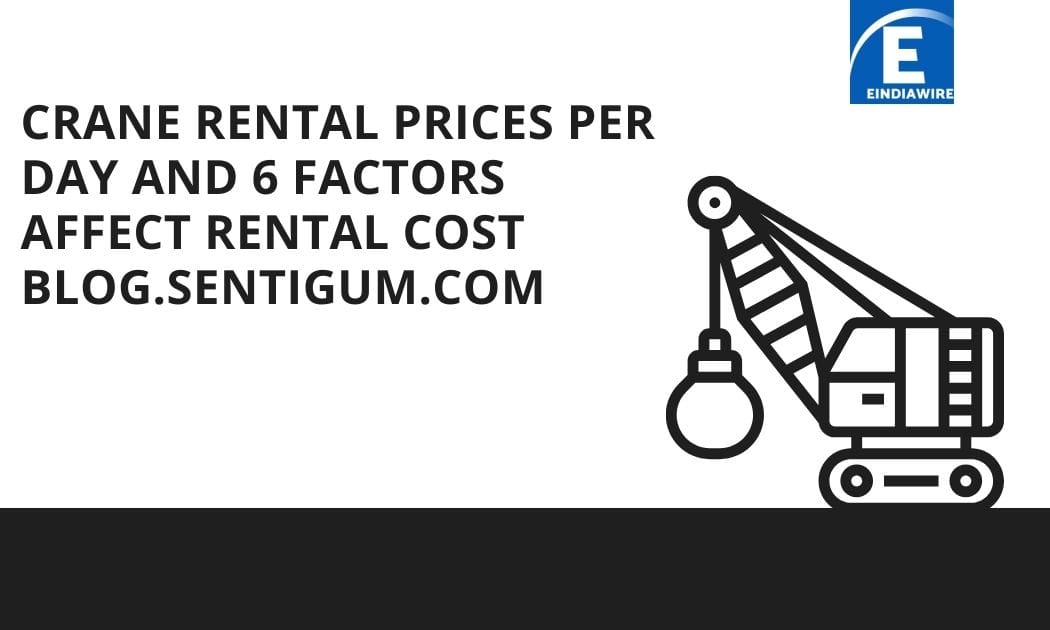Crane leasing is one of the necessary services which are available for construction, manufacturing, and other industries allowing for easy lifting of heavy objects. For intelligent cost control, one must know the charges of hiring cranes and the factors that affect the charge. So let’s start our article on crane rental prices per day and 6 factors affect rental cost blog.sentigum.com.
Overview of the Crane Leasing Cost
To develop a total cost, the cost is dependent on the type of crane; requirements on the project; and the duration of rental. Here’s an approximate general estimate:
- Small cranes (Mobile Cranes, etc.): $200–$600 per day
- Hydraulic Cranes: $1,000–$2,000 per day
- Tower Cranes: $10,000–$15,000 per month
- Specialized heavy-duty cranes: $20,000+ per month
Prices may differ based on location, equipment specifications, and the rental company.
Factors Influencing Crane Rental Costs
1. Crane Type and Dimensions
- Larger and more complex cranes command higher rates.
- Common categories include mobile, tower, crawler, and hydraulic cranes.
2. Rental Duration
- Short-term hires: Higher costs per day.
- Long-term hires: Lower daily rates but higher cumulative expenses.
3. Project Location and Logistics
- Urban projects typically cost more to obtain permits and set up.
- Delivery fees are more expensive for remote or challenging locations to access.
4. Lifting and Reach Requirements
- More powerful cranes or those with greater reach require more sophisticated systems, which are often associated with higher costs. .
5. Preparation of Site
- A site that is unprepared for erection will delay a schedule, increasing rental period.
6. Labour Expenses
- Qualified operators, riggers, and signalers ensure safety but add to the expense budget .
Other Costs to Be Considered
- Insurance: Covers damages or accidents during use.
- Permits: Necessary for urban and special operations.
- Fuel: High usage, in particular hydraulic machines, increases costs.
- Maintenance: Some suppliers offer this in the rental, while others charge extra .
Key Considerations When Choosing a Crane Rental Company
1. Know Your Needs
- Determine weight, height, and material requirements.
- Inform the rental company of more specific project details.
2. Compare Providers
- Check for rate, terms, and extra facilities.
- Give priority to vendors that conduct free on-site evaluation.
3. Inspect Equipment and Certifications
- Check on the readiness status of a crane and confirm the qualifications of the operator.
4. Agreement Negotiation
- Negotiate for the best deals or special offers for long-term rentals .
Benefits of Crane Rentals
- Cost Savings: No capital outlay and no maintenance required.
- Access to Latest Technology: Leverage modern-day gear without the need to own it.
- Professional Assistance: Many providers include skilled operators, planning, and maintenance .
Common Crane Types and Applications
- Mobile Cranes: Flexible, ideal for medium-scale tasks.
- Tower Cranes: Essential for constructing high-rise buildings.
- Crawler Cranes: Suited for uneven terrains due to built-in stability.
- Hydraulic Cranes: Excellent for heavy, precise lifting in industrial settings .
Safety Guidelines for Crane Rentals
- Employ Qualified Experts: Minimize chances of accidents.
- Scheduled Inspection: Maintain all equipment in perfect condition.
- Observe Weight Limits: Keep loads to not exceed structural capacity.
- Effective Communication: Proper hand and head signals between operators and ground personnel protects from hazards.
Future Trends of Crane On-Hire Services
- Robotization and AI: Enhance operations’ efficiency and speed.
- Sustainable Models: Increasing use of electric and hybrid cranes.
- Flexible Rental Terms: Introduction of hourly rentals for minor tasks.
- Digital Solutions: Platforms that make booking and planning go fluid .
Conclusion
In conclusion of crane rental prices per day and 6 factors affect rental cost blog.sentigum.com, we can say crane rental costs depend on various elements, including crane type, duration, and project location. By understanding these factors and planning efficiently, you can make cost-effective choices for your business. Collaborating with reputable rental providers ensures safe and seamless project execution.
FAQs
It normally ranges from about $200 up to $2,000 depending on the kind as well as size.
Most companies supply operators for safety. Self-operation also requires certification.
Generally delivery, setup, operation is considered in quotations.
Additional charges include insurance, permits, delivery, and operator charges.
Mobile cranes are great for small-scale residential works, and they come relatively inexpensive.
Many provide free inspections that can help them recommend the most suitable crane.
Proper planning, suitable equipment selection, and negotiation terms will be able to minimize expenses.








